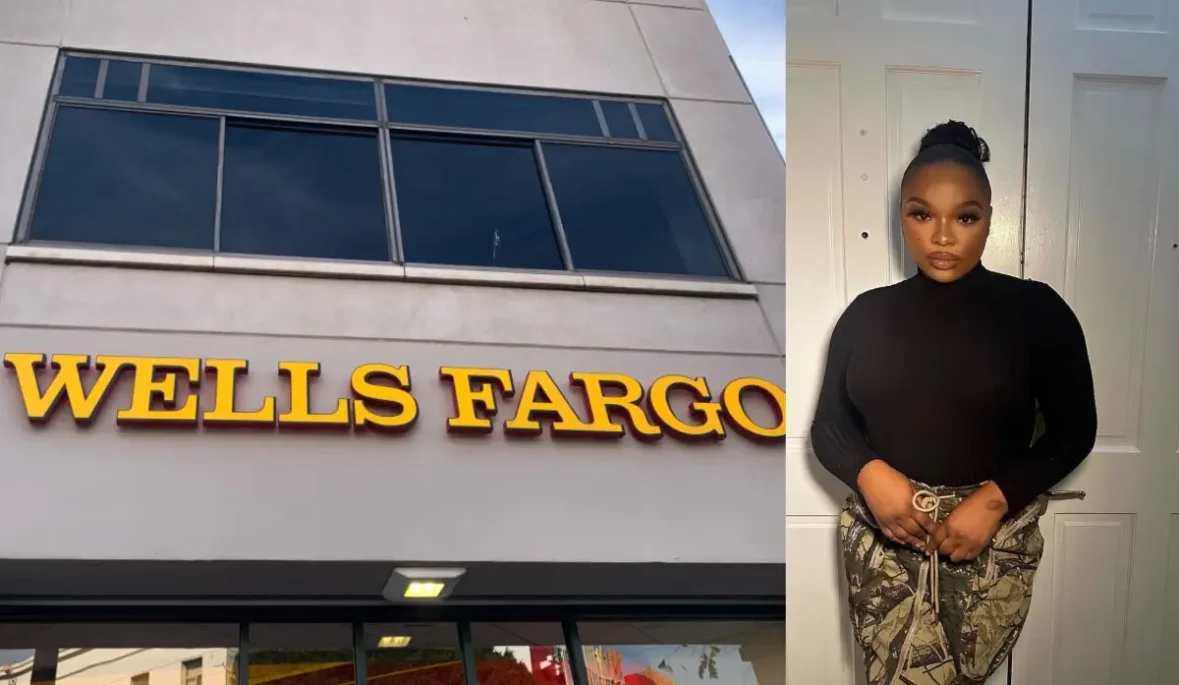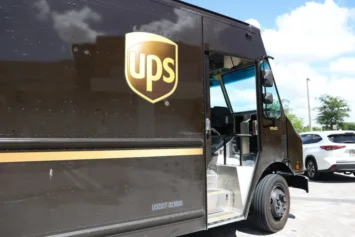A Wells Fargo customer in Los Angeles says as much as $40,000 vanished from her account late last year, prompting an ongoing battle with the bank to get her money back as a rash of similar mishaps have stunned account holders nationwide.
Efeti Egun filed a complaint with the Consumer Financial Protection Bureau earlier this year after she said tens of thousands of dollars went missing from her account between August and December 2023, while the bank took no action to protect her money or alert her to any suspicious activities.
Egun said she had as much as $38,000 to $40,000 in her personal account last summer, but five months later everything was inexplicably gone.

Not realizing her situation at first, Egun tried to order dinner one night on DoorDash when her bank card declined.
“I just used Apple Pay, like you know how you just use your Apple Wallet to pay, you can just click it on the side and it says insufficient funds,” Egun told Atlanta Black Star in an interview Wednesday. “And I said wait, what what do you mean insufficient funds?”
When she checked it out, she said she was shocked to learn that someone had cleaned out her bank account, leaving her nearly penniless, with just $11 to her name.
The ordeal got worse when Egun contacted her bank of eight years, whose representatives made no guarantees.
Instead, Wells Fargo advised Egun to contact Apple, where tens of thousands of dollars in fraudulent purchases had been made by siphoning money from her bank account.
Egun provided a transcript showing dozens of person-to-person payments between July and November 2023, with each transaction ranging from $500 to $3,000, while adding up to $42,835.74.
An Apple technician later reviewed the payments with Egun and confirmed $42,000 worth of fraudulent transactions on Apple Pay.
Still, the tech giant refused to pay anything for Egun’s losses, and eventually told her to go back to the bank, stating that Wells Fargo allowed the charges to rack up and should therefore settle with Egun.
In January, Wells Fargo assigned a private investigator to the case, and Egun said the bank concluded that she lost about $33,000 due to the fraudulent purchases.
Later, she found out through the Consumer Financial Protection Bureau that she’d actually lost a lot more as $9,500 was cited in an audit by the bank after more fraudulent charges were discovered on Egun’s account.
However, Wells Fargo has resisted putting any money back into Egun’s account, and has also stopped picking up the phone after months of back-and-forth, she said. Even though, Egun said they confirmed that she was a victim of spoofing.
Previously, a Wells Fargo agent told Egun that the bank didn’t detect the fraudulent payments from her account because she had used Apple Pay in the past, so it didn’t raise any red flags.
“I told her that doesn’t make sense. So because I’ve used an app before, money can just be leaving in duplicates from my account and you guys can catch it. That does not seem like a me problem. That seems like a Wells Fargo problem.”
Egun indicated that she had trusted the bank to alert her if large amounts of money ever drifted out of her account.
“It’s not like I just let the money leave, too, because people keep saying like, ‘Oh, how do you just let it go?’ I wasn’t being notified about anything. As the money was leaving my account, no verify. Verify. This is unique. Are you sure you want to send that money but there was nothing? Nothing, not one phone call nothing. They just allow that money to leave.”
Despite separate investigations at both Apple and Wells Fargo, Egun said she’s received nothing more than a mountain of excuses that make no sense, while the prospects of getting her money back appeared to be fading.
“They just don’t want to do anything about it. It’s like they’ve just been giving me the runaround,” Egun fumed. “They don’t want to give me my money back. Even though they know it’s a mess up. They know it’s a messed up system.”
Earlier on TikTok, Egun said Wells Fargo told her the bank couldn’t find evidence she was spoofed.
Egun said she has filed the official paperwork to dispute the excessive charges, but Wells Fargo told her that she had already missed the deadline to request a review.
Egun said she felt abandoned by her bank.
“They have called me, they have said themselves that this is obviously fraud,” she said. “They have said it’s obviously fraud, but they don’t want to do anything about it.”
She said the bank continues to point the finger at her.
“Wells Fargo keeps blaming me for the transactions but it isn’t me and I have given everything I can to prove it is not.”
Egun has hired an attorney and expects the case to go to court soon as Wells Fargo insists that it cannot prove whether actual fraud occurred in this case.
“They know I was hacked, I don’t know what they’re talking about,” Egun said. “Like they just don’t want to do anything. And I think that money is insured. I was told that once you put your money in the bank, like there’s insurance on your money up to $250,000 for when things like this happen, we can reimburse you your money. That’s what was supposed to happen. But for some reason they don’t.”
Wells Fargo representative Josh Dunn told Atlanta Black Star that when a customer reports a suspected fraud or scam scenario, the company takes “the situation seriously and thoroughly investigate the matter.”
“While we cannot provide the specifics of this customer’s situation for privacy and confidentiality reasons, we can confirm we researched the matter and the evidence supports our decision. We are communicating directly with our customer,” Dunn said in an email statement.
Instances like this are becoming more prevalent in the era of internet crime, while many of those affected find they have fewer consumer protections than assumed, as Egun discovered.
Banks typically offer some level of protection against fraud, but the specific coverage can vary from bank to bank.
Many bank customers like Egun assume they will be safeguarded from fraud by the Federal Deposit Insurance Corporation, or FDIC, which primarily insures deposits up to $250,000 in the case a bank fails, but does not directly cover losses from fraudulent transactions.
Instead, fraud protections are often provided by the bank itself, card networks like Visa or Mastercard, and federal regulations that cover electronic fund transfers. These protections might include zero liability policies for unauthorized transactions and investigation processes for disputed charges.
Egun has shared her ordeal on social media, posting several TikTok videos, hoping to bring more attention to a recent surge of banking issues that have ensnared an untold number of people across the country in recent months.
For now, it was unclear whether the ongoing accounting mishaps were indicative of a broader problem or merely a series of coincidences.
One situation involved several frustrated customers at Regions Bank, who recently made a claim similar to Egun’s, saying Regions had allowed fraudulent purchases to take place without alerting the account holders to any suspicious activities.
When the customers noticed fraudulent transactions, they immediately contacted the bank, but instead of reimbursing the money, the bank locked the accounts and deactivated all the associated check cards without notice.
Days later, some customers discovered even more fraudulent purchases on their accounts, but Regions did not notify them about these transactions, even after the earlier reported incidents.
The issue remains unresolved and many of the customers have since changed banks.
It’s unclear whether the victims will recover their funds, as many were unaware of their rights as bank clients due to not reading the fine print.
Customers who have lost money due to unauthorized transactions and who believe their rights were violated may have legal recourse under federal law, such as the Electronic Fund Transfer Act, which established rules for electronic transfers, including procedures for investigating and resolving errors.
Options could also include filing a complaint with the Consumer Financial Protection Bureau, seeking assistance from a consumer protection attorney, or filing a lawsuit against the bank.
But customers who embark on fixing the issues themselves face a gantlet of legwork as well as the high cost of obtaining a lawyer to guide them through the legal process.
The specific options available may depend on the circumstances of the case and the applicable laws in their jurisdiction.
A flurry of recent customer complaints included missing money and direct deposit delays at Bank of America following a payment processing glitch on April 2.
During the mishap, some Bank of America clients said it was nearly impossible to speak to an actual person about the problems with their electronic deposits after some bank customers reported getting their paychecks four days late.
Previously, Wells Fargo customers reported massive discrepancies in their bank accounts in 2022, leading to a $5 million lawsuit that accuses the bank of concealing credit card interest and billing the overage to U.S. servicemembers and their families since at least 2006.
Filed in the Eastern District Court of North Carolina, the lawsuit cites major violations of the Credit Card Accountability Responsibility and Disclosure Act, as well as the Servicemembers Civil Relief Act, which requires loans to be capped at a 6 percent interest and prevents the foreclosure or repossession of property.
In another notable case from last December, an Atlanta woman claimed she lost a $5,000 U.S. government-issued student loan check after Chase Bank claimed the payment was fraudulent, leaving her homeless and in debt after her accounts were frozen.
In February, a Black couple in Detroit filed a racial discrimination lawsuit against Comerica Bank, which refused to cash a $1,000 settlement check from an insurance company on four occasions last year, claiming the check was fraudulent.
As a result, Shanquese Jones, 23, and Bryan Craft Jr., 29, sued, accusing the bank of racial profiling in violation of Michigan’s Eliott-Larsen Civil Rights Act.
Although the lawsuit was brought on grounds of racial discrimination, the case still echoed complaints from the other bank customers whose paychecks were swallowed whole under questionable circumstances.
Jones said she intended to use her $1,000 check as a deposit to open a new account but was denied despite having satisfied all the bank’s requirements.
The bank employee told her to contact the insurance company to get the check reissued. A similar scenario played out the three subsequent times Jones attempted to cash newly issued settlement checks from her insurance company, according to the suit.
Months later, after repeated visits to the bank branch, the couple was accused of committing fraud, and officials confiscated the check and launched an investigation.
The couple’s lawyer, Brandon McNeal, told WDIV-TV that on Jan. 24, he tested whether the same issue would happen with a customer who was not Black.
“We sent a white customer to the exact same Comerica Bank branch location, and they had a settlement check for $1,000,” McNeal said, according to WDIV-TV. “It was drafted up on a Comerica Bank account, and that white customer had none of the same issues.”
McNeal also told the news outlet of the couple’s case, “Comerica Bank has effectively stolen their check and provided them no recourse but to file this lawsuit.”
Banks can also close accounts for just about any reason, often without being required to provide advance notice or make exceptions.
The Consumer Financial Protection Bureau cited more than 2,941 complaints due to unexpected account closures throughout 2023, underscoring the frequency and widespread impact of these issues.
Customer complaints often stem from a disconnect between bank policies, which are developed to meet regulatory requirements and compliance standards, and the actual needs and expectations of account holders.
While banks must adhere to regulatory obligations, they also need to ensure that their policies effectively protect customers and provide satisfactory service in a balancing act that is crucial for maintaining trust and transparency in the banking sector.
Back in Los Angeles, Egun vowed to remain vigilant. She has created a GoFundMe as she said she was running out of other viable options to get her money back.
“It’s not right. Not right at all. Even if it was $1 being knocked out of my account I should have known I should have been called I should have been alerted. But to let that much money leave no nothing and then I’m fighting for my money. [Wells Fargo is] trying to find reasons or excuses to not getting my money. It’s not right.”


